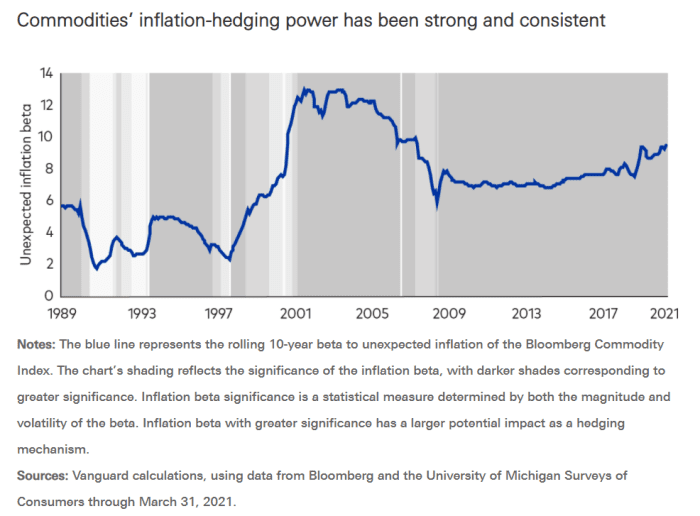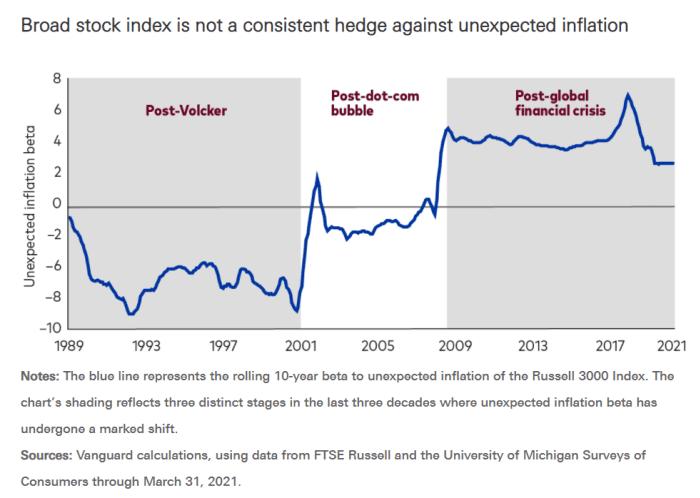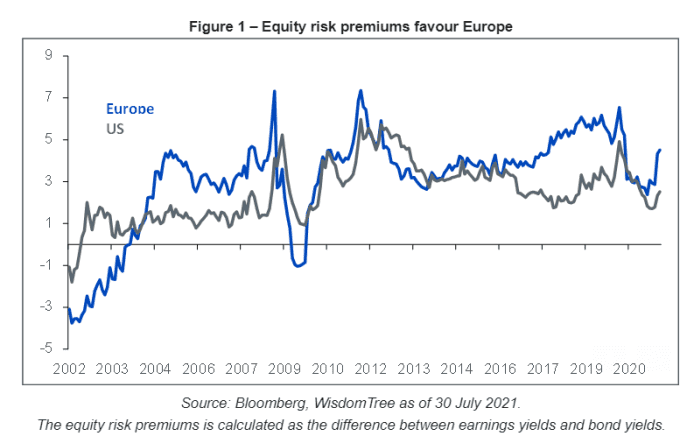This post was originally published on this site
Not all inflation hedges are created equally.
Investors certainly have been flocking to Treasury inflation-protected securities, or TIPS, with the yield on the 10-year TIPS near a record low, at negative 1.08% on Monday. But according to research from index fund giant Vanguard, the beta to unexpected inflation is around 1. That is, a 1% rise in unexpected inflation would produce a 1% rise in the value of TIPS.

Commodities’ inflation-hedging power, by contrast, is far stronger, and it has been for some time. Over the last decade, commodities’ inflation beta has fluctuated between 7 and 9, meaning that a 1% rise in unexpected inflation would produce a 7% to 9% rise in commodities.

Equities, of late, have been a better inflation-fighting hedge, though still not as good as commodities. The beta of the Russell 3000 to inflation is now positive — unlike in the 1990s — though it has declined in recent years. The Vanguard research notes that commodity-related sectors such as energy and materials now represent a smaller part of the equity market than before, while ineffective inflation hedges technology and consumer discretionary sectors are larger.
And the worst inflation hedge is bonds, as rising interest rates erode their value.
The buzz
Retail sales data highlight a busy slate of releases, and are expected to show a monthly decline for July.
Home-improvement retailer Home Depot
HD,
reported slower same-store sales growth than forecast even as earnings exceeded estimates, as Walmart
WMT,
both beat earnings and sales forecasts and lifted its sales guidance for the year. Walmart shares slipped 1% and Home Depot fell 3% in early premarket action.
The U.S. is set to recommend booster COVID-19 shots eight months after vaccination, according to the New York Times. New Zealand went into a three-day national lockdown over a single COVID case.
Quarterly filings made by fund managers showed that Berkshire Hathaway increased its bet on grocery chain Kroger
KR,
while cutting several of its healthcare investments, and that Michael Burry’s Scion Asset Management is betting against the ARK Innovation Fund
ARKK,
run by Cathie Wood.
Chinese internet stocks struggled, with Tencent
700,
and Alibaba
9988,
each falling 4%, as China drafted rules on competition and data security.
Videogame maker Roblox
RBLX,
slumped 7% in after-hours trade, after sales lagged behind estimates.
The market
U.S. stock futures
ES00,
NQ00,
declined, following a session in which the S&P 500
SPX,
and Dow Jones Industrial Average
DJIA,
each notched their fifth consecutive record high.
The New Zealand dollar
NZDUSD,
dropped, as the lockdown curbed expectations for tightening by the country’s central bank.
The chart

The equity risk premium — the difference between earnings and bond yields — has climbed to a 15-month high in Europe, thanks to strong earnings that have sent the net analyst revision ratio to the highest level since 2017, according to data compiled by fund manager WisdomTree. The Stoxx Europe 600
SXXP,
on Monday snapped a 10-session winning streak, its longest in 14 years, as the index has climbed 18% this year.
Random reads
Magnetic strips will be phased out of Mastercard credit cards.
Pi has now been calculated to a staggering 62.8 trillion digits.
Need to Know starts early and is updated until the opening bell, but sign up here to get it delivered once to your email box. The emailed version will be sent out at about 7:30 a.m. Eastern.
Want more for the day ahead? Sign up for The Barron’s Daily, a morning briefing for investors, including exclusive commentary from Barron’s and MarketWatch writers.

